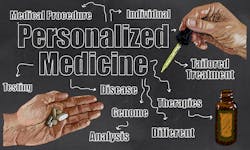Precision Population Health Initiative Targets Precision Medicine Delivery in Primary Care
Ariadne Labs, a joint center for health systems innovation at Brigham and Women’s Hospital and Harvard T.H. Chan School of Public Health, has announced the launch of the Precision Population Health initiative, which aims to solve the system challenges involved in adopting precision medicine in primary care settings.
Developed in collaboration with Genomes2People, a research program at Brigham and Women’s Hospital, the Broad Institute and Harvard Medical School, this new initiative will create implementation pathways, tools and guides that work across various clinical contexts with the ultimate plan of making these accessible to health systems interested in adopting and practicing precision medicine at scale.
Ariadne Labs has been exploring the role of precision medicine in primary health care since 2018 as part of the organization’s Spark Grant innovation incubation pipeline. That project, led by Nic Encina, formerly chief science and technology officer at Ariadne Labs, and newly appointed director of strategy of the Precision Population Health initiative, found that while precision medicine has revolutionized specialty care, particularly in the oncology and rare disease spaces, a knowledge chasm often exists between specialty care and primary care.
“After nearly two decades since the Human Genome Project revolutionized our understanding of the role of genetics on human health, we’re finally on the verge of seeing these discoveries being applied more broadly to patients,” said Encina, in a statement. “This initiative will use our combined expertise in public health, genomic medicine and health system innovation to address the implementation challenges in translating these technologies across healthcare contexts.”
The initiative will address a broad spectrum of implementation challenges related to translating precision medicine into primary care, ranging from clinician training and team coordination to outlining important considerations when choosing a lab or test to patient education. (Healthcare Innovation has followed the efforts of several health systems to make progress on precision medicine by increasing clinician and patient education efforts and embedding genetic counselors in primary care clinics.)
The Precision Population Health initiative will be led by Robert C. Green, M.D., M.P.H., professor of medicine (genetics) at Harvard Medical School and a physician-scientist who directs the Genomes2People Research Program. That program currently conducts empirical research in translating genomics into health, including the first rigorous trials to provide comprehensive genome sequencing to adults and newborn infants.
Additional investigators and policy leaders who will be contributing to the new initiative include Elizabeth Karlson, M.D., M.S. at Brigham and Women’s Hospital, Kurt Christensen, Ph.D. and Ann Wu, M.D., M.P.H., at the Harvard Pilgrim Health Care Institute, Jason Vassy, M.D., M.P.H., at the VA Boston Healthcare System and Tshaka Cunningham, Ph.D., of TruGenomix Health Inc. and the Faith Based Genetic Research Institute.
“If precision medicine is to be fully integrated into population health and the day-to-day practice of medicine at scale, significant health system innovations will be required,” said Atul Gawande, M.D., M..PH., founder and chair of Ariadne Labs, in a statement. “Together, Ariadne Labs and Genomes2People are uniquely positioned to make precision medicine accessible to all patients—whether they’re treated at a major academic medical center or in a small, community-based setting.”
One of the Precision Population Health initiative’s first projects will be supporting Beaumont Health, Michigan’s largest healthcare system, to initially assess the opportunities and challenges in implementing genomics and precision medicine to benefit its patients served by three of its hospitals.


